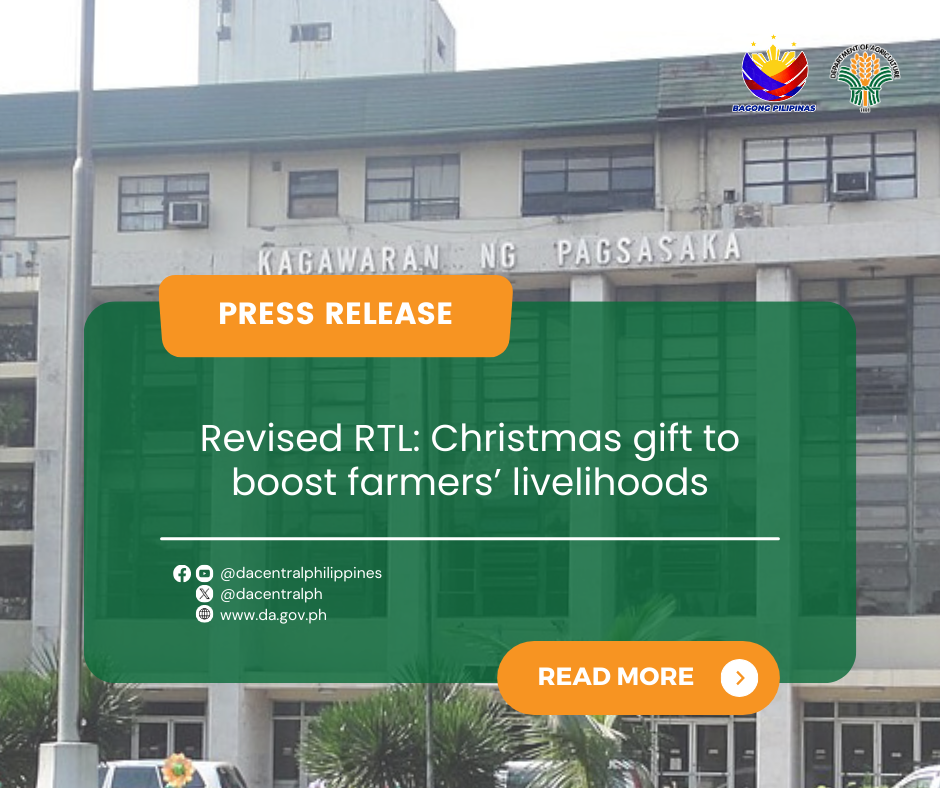
Agriculture Secretary Francisco P. Tiu Laurel, Jr. said the amended Rice Tariffication Law (RTL), which took effect on December 25, is a fitting Christmas gift for millions of Filipino farmers and their families who depend on rice production for their livelihoods.
The revisions, introduced under Republic Act 12078, promise to enhance the sector’s resilience and improve the living standards of rice farmers, he said.
One of the key changes under the revised RTL is the tripling of funds allocated for the Rice Competitiveness Enhancement Fund, or RCEF, to P30 billion, which will be used to modernize and mechanize rice farming in the Philippines.
The fund’s duration has also been extended by six more years, until 2031. The additional resources, which total P180 billion, are expected to fast-track technological advancements in rice production, boosting efficiency and output across the country. As a result, it is expected to boost farmers’ income and make rice, the country’s national staple, more affordable to consumers.
“We welcome these changes to the RTL, introduced under Republic Act 12078, that would allow the DA to provide more funds to fasttrack the modernization of the rice industry and significantly improve the lives of millions of Filipino rice farmers and their families,” Sec. Tiu Laurel said.
Another major revision shortens the period of rice held as reserve by the National Food Authority (NFA) for emergency use to become “non-regular” stocks from three months to two. This change is expected to improve both the quality and quantity of rice available for the Marcos administration’s P29 per kilo rice program.
The agri chief welcomed this amendment, noting “it will improve NFA’s financial standing by reducing the need for borrowings to fund operations, including payroll expenses.”
Additionally, the revised RTL gives the Secretary of Agriculture the authority to declare a national food security emergency in cases of supply shortages or extraordinary price fluctuations. This would enable government to release all NFA buffer stocks and facilitate emergency rice importation to stabilize prices and counteract potential market manipulation by unscrupulous traders.
The new RTL continues to restrict the NFA from selling buffer stocks directly to the public, limiting its role to handling rice reserves intended for emergency use. NFA Administrator Larry Lacson, in a recent House hearing, testified that shortening in the period when reserve rice becomes “non-regular” stocks would result in a significantly increase in available supply for the P29 program, providing consumers more option for better quality but affordable rice.
Of the P30 billion allocated to the RCEF, P6 billion will be allocated for high-quality rice seeds, P9 billion for farm mechanization, and P15 billion for farmer training programs, financial assistance and credit, pest and disease management, soil health program, and infrastructure like solar-powered irrigation systems. The fund aims to ramp up production of certified inbred rice seeds, with a target of producing 5.5 million bags annually by 2027. This will cover 2.54 million hectares of land and increase average rice yields by up to 21 percent.
These initiatives, in line with government’s broader efforts to ensure food security, aim to strengthen the Philippine rice industry and reduce the country’s reliance on rice imports while increasing the incomes of local farmers. ###














